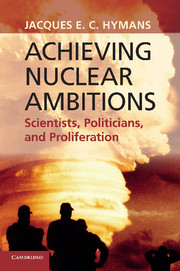
Congratulations to Jacques E.C. Hymans for winning the 2014 Grawemeyer Award for Ideas Improving World Order. The award is administered by the University of Louisville’s Department of Political Science. Disclosure: I’m currently the Department chair and for 17 years I directed the award (1994-2011). There’s more on the local angle at the end of this post.
Hymans won the $100,000 prize for his 2012 book Achieving Nuclear Ambitions; Scientists, Politicians, and Proliferation. Here’s a brief description from the Cambridge University Press webpage:
Despite the global spread of nuclear hardware and knowledge, at least half of the nuclear weapons projects launched since 1970 have definitively failed, and even the successful projects have generally needed far more time than expected. To explain this puzzling slowdown in proliferation, Jacques E. C. Hymans focuses on the relations between politicians and scientific and technical workers in developing countries. By undermining the workers’ spirit of professionalism, developing country rulers unintentionally thwart their own nuclear ambitions. Combining rich theoretical analysis, in-depth historical case studies of Iraq, China, Yugoslavia and Argentina and insightful analyses of current-day proliferant states, Achieving Nuclear Ambitions develops a powerful new perspective that effectively counters the widespread fears of a coming cascade of new nuclear powers.
I’ve read the book and would certainly recommend it to anyone interested in nuclear proliferation, national security, rogue/outlaw state policymaking, science policy in general, and even public administration. I’m not being flippant with that diverse list. The book already won the American Political Science Association’s 2013 Don K. Price Award, which recognizes the best book on science, technology, and environmental politics. And it won the 2013 National Academy for Public Administration’s Louis Brownlow Award. That is the top prize in public administration.
Obviously, the book has important policy implications for current discussions about Iran’s nuclear program. I found the overall argument and the case studies fascinating, and the evidence compiled by Hymans is quite convincing — though some might bicker with his discussion of China’s nuclear success during the 1960s.
I should probably also disclose that I’ve known Jacques Hymans for many years because we were both contributors to a 2006 edited book project on preventive war. The Working Group first met in February 2004. Essentially, we’ve seen each other maybe half a dozen times at workshops and conferences in the past nine years. We’ve also had tea in Harvard Square after a talk we both attended and chatted over a beer in San Diego at a reception at ISA. These kinds of interactions are certainly common among colleagues in the field and I’ve had similar interactions with many other prior winners (and non-winning nominees) over the years.
Ready for some inside baseball about the award process? As I mentioned last year, the multi-tier vetting process employed by the Grawemeyer Committee was established more than two decades ago. The Department chair is one of many individuals with a seat on the Award’s Final Selection Committee. Other members include the Dean of the College of Arts and Sciences (or a designated representative), the University President (a role long passed to the Executive Director of the Awards), and several “lay” members of the community.
Of course, books do not magically appear on the Final Selection Committee’s reading list. Nominations for the award must be received by mid-January each year. Initially, nominated works (mostly books) are reviewed by a mix of University of Louisville and external readers — primarily academics from the pertinent field. The first round process concludes in early June, typically producing a short-list of about seven semi-finalists.
Through the summer, a three-person International Jury reads these seven works in order to recommend three finalists to the Final Selection Committee. The Jury members receive a list of all nominations and have the power to elevate an overlooked work to the semi-finalist list. After the Final Selection Committee reads the final three works, it recommends a winner to the University’s Board of Trustees for its approval.
For a list of all prior winners, visit this page.
Update: fixed a couple of minor errors.
Rodger A. Payne is a Professor of Political Science at the University of Louisville. He serves on the University’s Sustainability Council and was a co-founder of the Peace, Conflict, and Social Justice program. He is the author of dozens of journal articles and book chapters and coauthor, with Nayef Samhat, of Democratizing Global Politics: Discourse Norms, International Regimes, and Political Community (SUNY, 2004). He is currently working on two major projects, one exploring the role of narratives in international politics and the other examining the implications of America First foreign policy.

Congratulations to Jacques! It’s an excellent book.